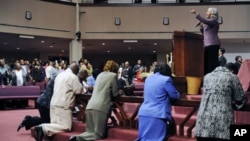It's Sunday morning at the Jammin Java cafe in Vienna, Virginia. A group of people have gathered in the back - to pray. The sticky floors and low lighting are not exactly inspirational. But this is no ordinary church. It's a new kind of worship that has sprung out of Evangelical Christianity and is being called the Emerging Church.
This particular group calls itself the Common Table. Mike Stavlund, one of the organizers, cradles his baby in his arms as he talks about why dozens of people are gathered here.
"I think people are seeking a personal interaction with the Christian tradition," he says, "so they want to have something they can participate in, something they can feel free to understand and misunderstand."
Only a generation ago, Evangelical Protestants were flocking to so-called megachurches with congregations that numbered in the thousands. The worshippers were fundamentalists, including Evangelicals, who view the Christian Bible as the literal truth. The churches were often led by a charismatic pastor who gave fiery sermons against abortion or homosexuality.
Now, a new generation of Evangelical and other Christians is seeking a more personal experience with a different political tone. They are meeting in more intimate settings, like the corner cafe, and no one is told what to believe.
On this particular Sunday, worshippers discussed civil rights. They wrote confessions on papers that were read out anonymously.
"I'm haunted by race issues," one of them said. "I stumble over words whenever I meet black people."
Stavlund says it's okay to question anything - even the most basic tenets of Christian belief.
"To me it feels like an honesty, when we have doubts to say we've got doubts, when we've got faith to say we've got faith, but in all of it to be able to be accepting of everybody else," he says.
Many Common Table members are just starting families and searching for a way to practice their faith differently from how their parents did.
Having a woman lead the service is one way Common Table is different. After administering the sacrament, Amy Moffitt says that rightwing politics turned many people here off to megachurches.
She grew up in Virginia when the Christian Right became influential in Evangelical Christianity.
"When I think of the politicization of this church, I think of the political structure of the institutional church that inevitably leads to power struggles and issues around money. And what's really important to me in the Emergent Church is that we avoid that," she says.
Still, the Emerging Church movement is treading on ground that traditionalists call unorthodox, if not heretical.
Rob Bell, an Emerging pastor from Michigan, has drawn criticism over his new book. It argues that people of all faiths can go to heaven - something many Americans believe but Evangelical theology rejects.
Mark Caleb Smith is a political science professor at the conservative Christian Cedarville University in Ohio.
"If I had to guess, I would say you're going to start seeing splintering among Evangelicals, and people are going to start to choose sides," he says. "And if you know your church history, this isn't unusual."
Indeed, Christianity in America has a long history of schisms, and there are hundreds of Protestant denominations.
But young Americans are increasingly shunning them. One study found that adults aged 18 to 29 who say they don't identify with any denomination have more than doubled in the last two decades.
One of the authors of that study, David Campbell, at Notre Dame University, says he expects American Evangelical Christianity will adapt to the younger generation, though Emerging Churches will not necessarily be the next big success.
"Just as the Megachurch as we know it today recreated what it meant to belong to a church and gave people a sense of community in a period where other civic institutions were failing, there's going to be some style of religion - maybe it's this Emerging Church, maybe it's some other movement - that will reach these young people."





